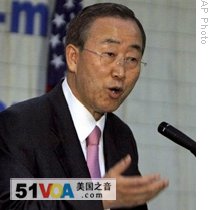United Nations
13 July 2009
 |
| U.N. Secretary-General Ban Ki-moon speaks to reporters before his departure from Rangoon, Burma, 04 Jul 2009 |
Mr. Ban briefed members of the U.N. Security Council Monday on his visit earlier this month to Burma, where he met with Senior General Than Shwe, the prime minister, and other government leaders.
The U.N. chief had support from the council for the two-day visit, but it has been widely seen as a failure because he was unable to meet with Aung San Suu Kyi or affect any real outcome on other pending issues.
"Let me say that the refusal of the senior leadership to allow me to meet Daw Aung San Suu Kyi was not only a deep disappointment, but also a major lost opportunity for Myanmar. While this should not define our efforts, allowing such a meeting would have sent a constructive and conciliatory signal, both inside and outside Myanmar," Mr. Ban said.
Burma is also known as Myanmar.
Burma's U.N. envoy U Than Swe defended his government's decision, saying the Senior General was willing to arrange the meeting, but it was the decision of the Special Court that is trying Aung San Suu Kyi not to allow it.
Mr. Ban said that during his two meetings with the Senior General he discussed the need for the leadership to take meaningful steps toward the release of all political prisoners. He also urged resumption of talks between the government and the opposition, and creation of the conditions for credible and legitimate elections next year.
Mr. Ban said he received assurances that the 2010 general elections would be free and fair, but cautioned such promises must be translated into concrete action.
Burma's Ambassador U Than Swe told the Security Council that his government intends to implement what he called "all appropriate recommendations" of the secretary-general, and in a surprising announcement said his government is considering an amnesty for prisoners.
"At the request of the secretary-general, the Myanmar Government is [sic] processing to grant amnesty to prisoners on humanitarian grounds and with a view to enabling them to participate in the 2010 general elections," he said.
Speaking to reporters outside the council chamber, Mr. Ban said that news was "encouraging" but he would have to follow up to know exactly what it meant and who it included.
Within the Security Council, reaction was mixed toward the secretary-general's briefing and the Burmese government's response to his visit.
Western countries took a tough line, calling on Burma's leaders to address international calls for it to release political prisoners and resume national reconciliation talks. Several members also expressed concern over the current trial of Aung San Suu Kyi, questioning the legitimacy of the charges.
The democracy activist who has been under house arrest for more than 13 of the past 19 years. In May, she was moved to a Rangoon prison and is currently standing trial for allegedly violating the terms of her house arrest after allowing an uninvited guest in without official permission.
Burma's allies, including China, Russia and Vietnam, took a much softer tone, saying Mr. Ban's visit was largely a success and accomplished all his goals - except meeting Aung San Suu Kyi. But they defended that, saying meeting her should not be the only measure of the trip's success and that he met representatives from several political parties, including hers.
China, in particular, urged the international community to make a fair and balanced assessment of the situation and urged the lifting of financial sanctions, that it said are unfairly hindering Burma's economic development.